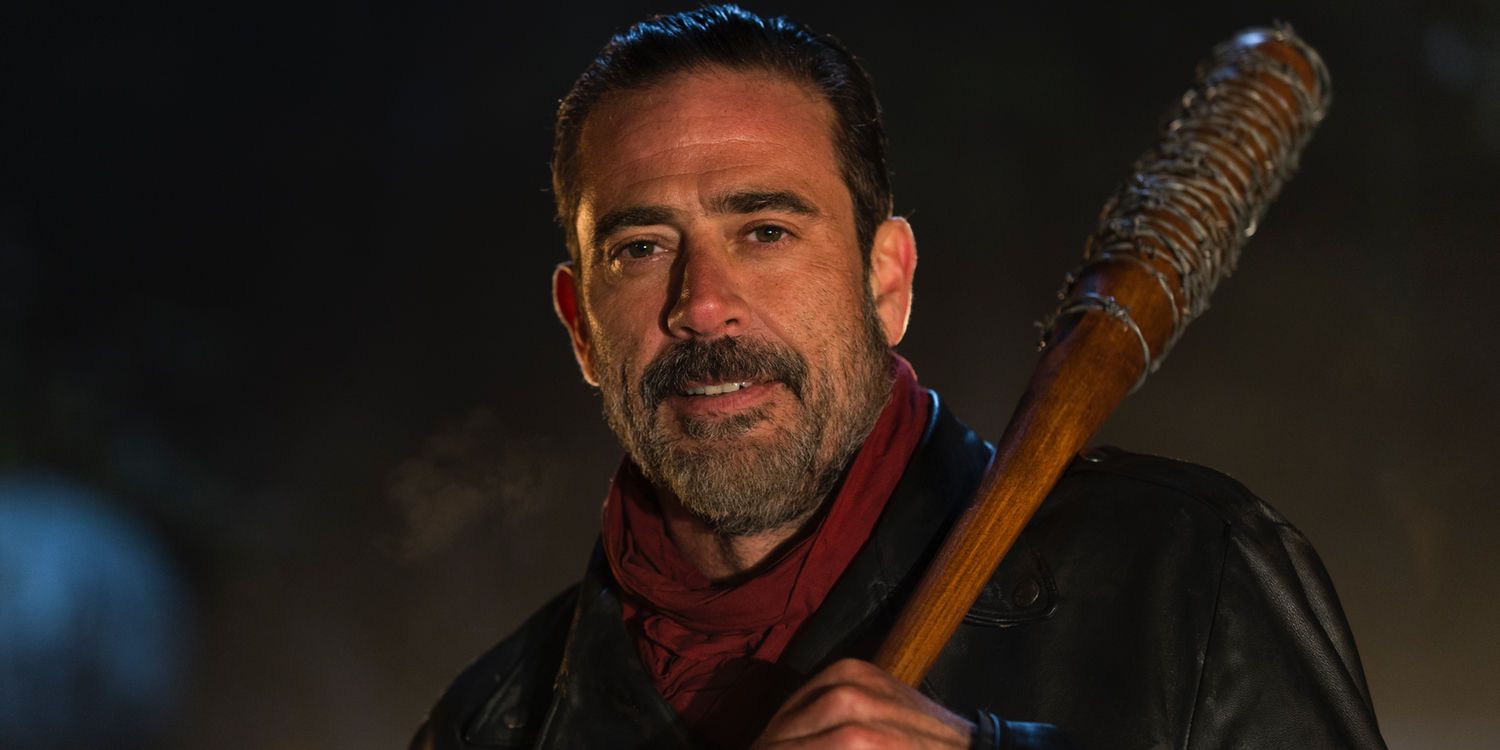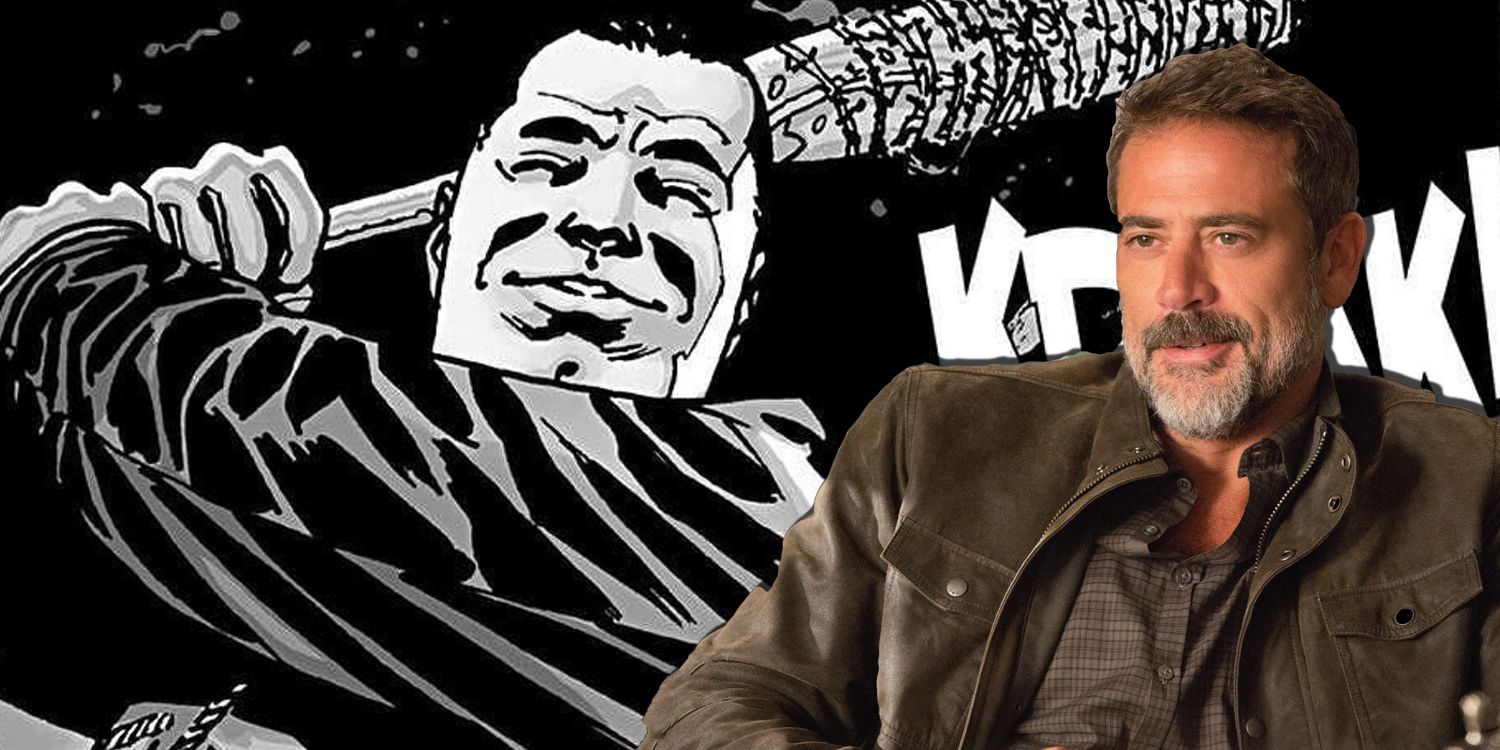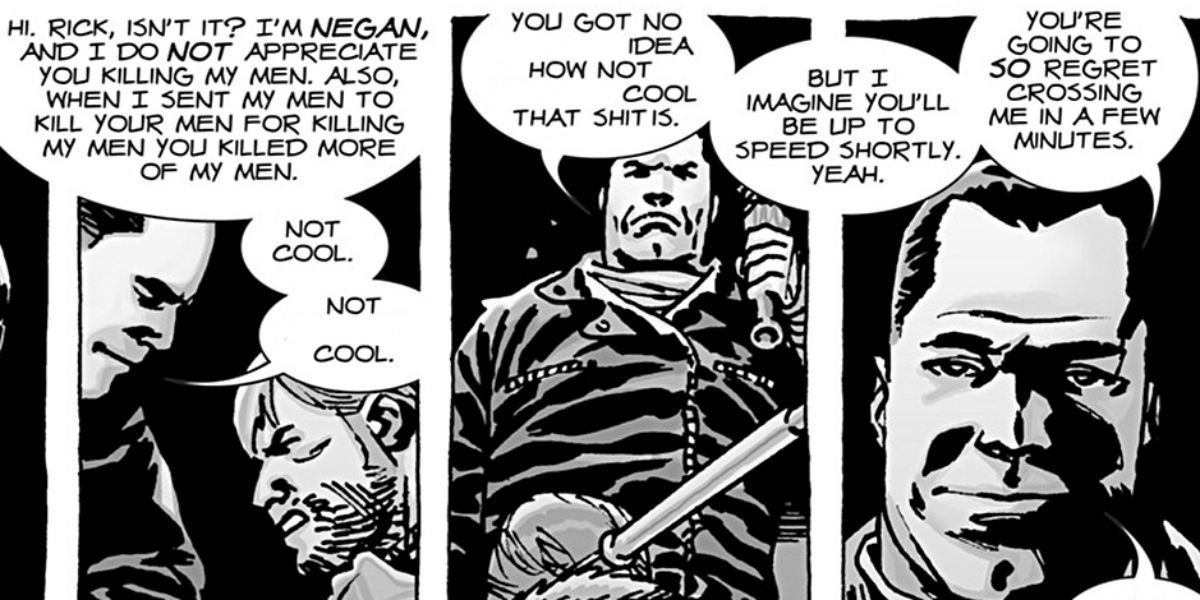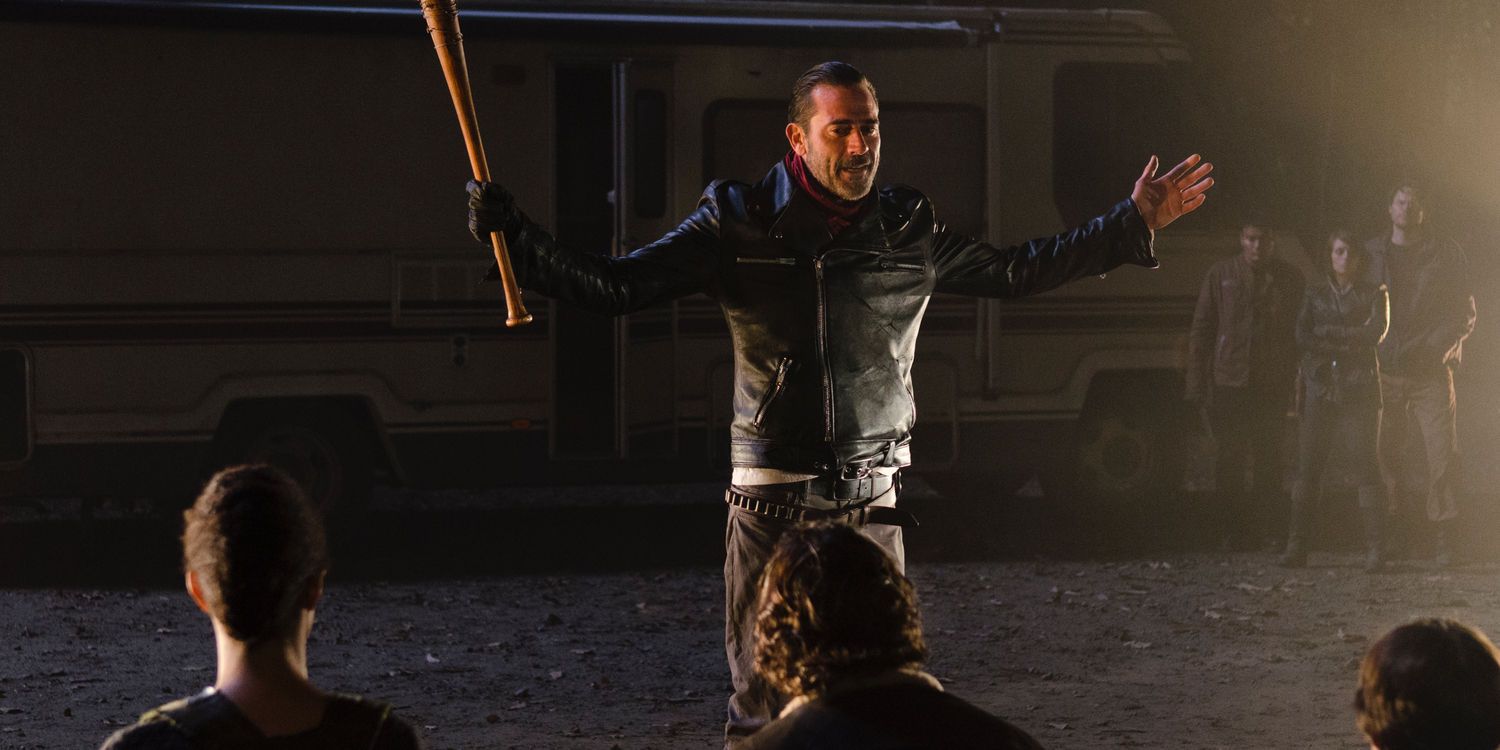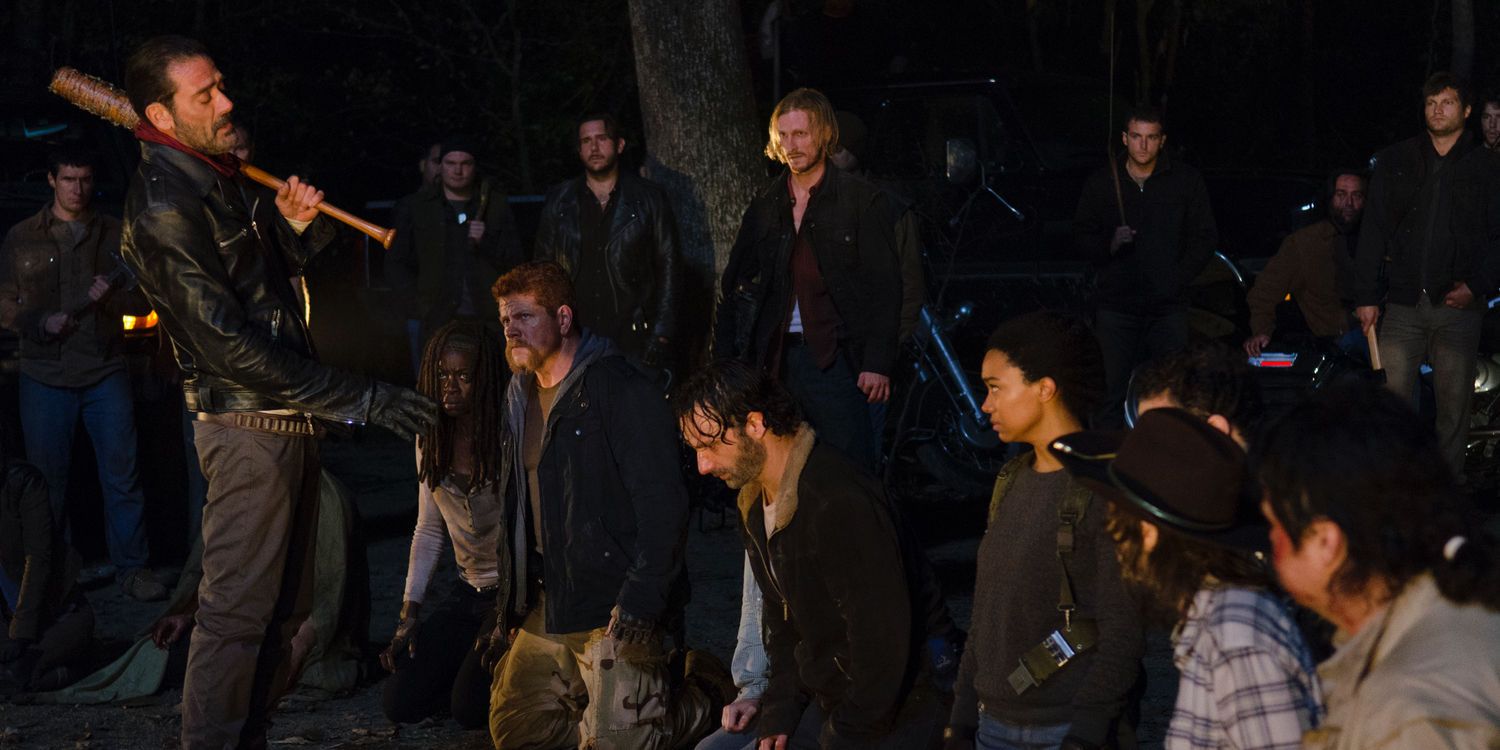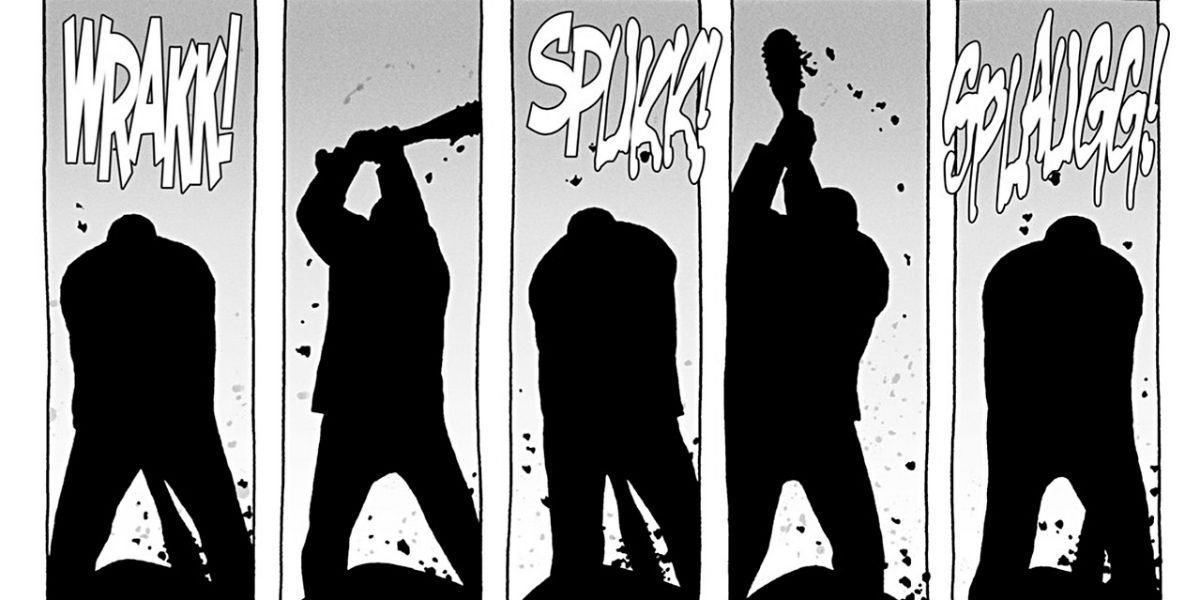[WARNING - This article contains MAJOR SPOILERS for The Walking Dead TV show and comic book.]
-
All season long fans have been waiting for The Walking Dead to debut Negan -- the show's latest and by far most anticipated Big Bad. Last night the villain arrived on the scene in epic form, and though there were notable differences between the character Jeffrey Dean Morgan so effortlessly embodies and the one readers met in The Walking Dead #100, Negan's menacing-yet-charming manner and business-like approach remain intact.
Still, with how little Negan is actually onscreen during The Walking Dead's 90-minute season 6 finale, viewers would be forgiven for not feeling quite the same mix of excitement and dread as their fellow fans who are more familiar with the character's comic book origins. (Not too mention the decision to end on a cliffhanger which arguably saps most of the tension from the scene.) The final moments of last night's episode are only half the story, and without the rest of Negan's now infamous introduction, the character feels unfinished.
To help explain and give further context to Negan and what his arrival means for The Walking Dead moving forward, we've compiled a primer on the character's personality and motivations.
Who Is Negan?
Negan is character whose reputation precedes him, and this is true for both the show and the comic. Before meeting Negan, leader of the Saviors, we hear about him from those living at the Hilltop, where a deal has already been struck between Negan and their leader Gregory, and from the members of his gang that Rick and his people have killed. This in itself, this long drawn-out teasing of Negan, helps create a sense of foreboding about the character.
And having previously met some truly vile and nasty characters like The Governor and the Wolves, it's easy to have assumptions about the sort of man Negan would be: hostile, crazed, erratic, etc. However, Negan is none of those things -- in fact, he's quite the opposite. For one, Negan is incredibly calm and level-headed, something made apparent in the finale, with Negan allowing Glenn's outburst. "First one's free," he says, "It's an emotional moment. I get it." Yet this genuine moment of understanding is followed by a clear threat to not let it happen again. Negan is capable of mercy, just don't expect it of him too often.
To this end, Negan does have something of code, a sense of honor (as twisted as it may be), that he holds both himself and his men to. Negan is pragmatic, and though he certainly enjoys violence --practically reveling in it -- he does not condone its use unnecessarily. For instance, had the residents of Alexandria not gone looking to put a stop to Negan or had simply accepted protection from the Saviors, then this whole scenario likely wouldn't have happened. "I don't want to kill any of you," Negan says, and he means it, but Rick and his group crossed a line and for that there's a punishment.
Negan represents the new world order, as he says, where the only rule is how far a man is willing to go. In the comic, writer Robert Kirkman signals this to us through Negan's fondness for F-bombs, which are sometimes funny, sometimes not, but always delivered with a threatening edge to them. The foul language, which extends beyond profanities to his obscene and morbid sense of humor, is a constant reminder of his willingness to break all the rules -- society as we understand it no longer exists, no need for the decorum and niceties.
(Obviously, this is a trait AMC is unable to duplicate, and though it works great on the page and has become a hallmark of the character, the television show shouldn't need to rely on it. Morgan's performance in that brief scene already provides plenty of menace, as does the horror and blatant fear on the faces of Rick, Michonne, Daryl, and everyone else.)
Yet, beyond being calm and rational and intimidating, Negan's most dangerous quality is how easily he manipulates people. It might be interesting to note that before the world ended Negan was a car salesmen. There's a likability to Negan that's hard to deny, though it also feels somewhat practiced. He knows how to read people and how to push their buttons, making them either respect or fear him.
What Does He Want?
In many ways, Negan is a foil to Rick. Both men know only too well how savage the world has become, and the kinds of deeds needed to have been done in order to survive this long. But both also understand that the world cannot continue as it is, that there is no sustainability in the chaos. Negan, just like Rick, recognizes the need for civilization, for the return of law and order -- they just differ in how to achieve it.
Rick wants to establish a sense of community within Alexandria, one where everyone's allowed input, even if the final decision is left to one person, some elected leader. Rick is hoping to set up trade between Alexandria and other communities, allowing them to help each other receive necessary supplies. Negan, on the other hand, is only interested in a civilization where he's in charge and others are subservient to him, where other communities supply him and his gang with what they need as "tribute" for being allowed to exist.
What Negan wants to build is a feudal system with himself the liege lord of the land, ruling through fear. Earlier in the season, when Rick and the others were first visiting the Hilltop and one of their own returns to stab Gregory on Negan's command, that moment alone proves the level of control Negan wields over people. Without even being present, Negan's "subjects" will execute his orders to the letter. We may have previously witnessed Rick mad with power, the "Ricktatership" as it was known, but it was no where near the level of control that Negan seeks. And in order to get what we wants, in order to stay in charge, Negan needs to force Rick to submit.
How Does He Get It?
As has already been mentioned several times throughout this article, the key to Negan's power is fear and intimidation. He's ruthless in his pursuit of power, using whatever means necessary to maintain control. Negan may be exceptionally charismatic and even funny, but he's deadly serious about remaining in charge. And recognizing something of an equal in Rick, he knows the only way a guy like him would ever back down is if he's made to feel utterly helpless.
For the most part, Negan's introduction is handled on the television show just as it is in the comic. On their way to the Hilltop, Rick and the group are ambushed by the Saviors. They are then forced on their knees and presented to Negan, who gives a speech that the TV show reproduces almost verbatim from the comics (minus all the swearing). Then, going down the line and giving reasons why he wouldn't kill each of them, though lamenting that he must kill someone, he decides using "eenie, meenie, miney, moe," and lands on Glenn.
What follows is to this day one of the comics' most disturbing and gruesome scenes, as the others -- including pregnant wife, Maggie and adopted daughter Sophia, who in the comics is still alive -- watch in horror as Negan repeatedly bashes in Glenn's skull with his baseball bat, Lucille. Like Negan, artist Charlie Adlard doesn't hold back when it comes to the carnage and as Glenn's head is quickly reduced to a mushy mess, Rick and the other survivors are completely and totally broken.
And this is just how it starts! Within the first minutes of meeting Negan, he savagely murders a long-standing and beloved character. It's the absolute lowest moment for Rick and everyone, unarmed and surrounded, there's nothing they can do but watch, helpless to stop him. The feeling of hopelessness we and the characters are left with once the damage is done is palpable, and it's there Kirkman ends the monumental issue, with Negan walking away from Glenn's lifeless, unrecognizable body and the remaining group. In this moment, they're utterly defeated and completely under Negan's rule.
On the television show, however, we don't see who Negan kills. Showrunner Scott Gimple explained the reasoning for their decision as the death is "going to be the start of another story," one they'll begin exploring next season. And while that's certainly true, it doesn't really excuse the finale's cliffhanger feeling like a cheap trick, leaving us needlessly in suspense for months to come.
Still, though Negan's full introduction is halted prematurely, what it promises is chilling. On The Talking Dead, Kirkman confirmed that Negan's victim is a character "beloved to everyone," which it needs to be if the moment is to have the same impact as it does in the comics. Negan may choose his victim at random, but Kirkman does not. It's Glenn who's murdered because outside of Rick and Carl (the only two characters that are potentially unkillable), there's no other character present we've known for as long. Killing Glenn in such a brutal manner is a moment meant to wound those with the most invested in the story -- that's why it's so monumental, so iconic, and why it turns Negan into the biggest and baddest villain in The Walking Dead.
-
The Walking Dead returns to AMC this fall.
Photos: Gene Page/AMC

